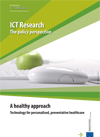
In this report produced for the publication series ICT Research: The Policy Perspective, we discover how information and communication technology (ICT) is revolutionising healthcare across Europe. Technology gives patients choice and control, while practitioners make more informed diagnoses and decisions. As research continues, citizens can expect to see their quality of life improve.
From a global perspective, most Europeans have little to complain about in life. We have food to eat, a roof over our heads, largely free education for our children. And even when unemployment bites or disaster strikes, robust social support systems generally come to our aid.
Yet our quality of life features at the top of all political agendas. Why? Because quality of life depends on far more than a full stomach and somewhere warm and dry to sleep. There is always more to be done so that citizens can be comfortable, safe, independent and happy.
Download A Healthy Approach - Technology for Personalised, Preventative Healthcare (.pdf, 464 KB).
Download from eHealthNews.eu Portal's mirror: A Healthy Approach - Technology for Personalised, Preventative Healthcare (.pdf, 464 KB).
This brochure has been produced for the Information Society Policy Link (ISPL) by the ICT Results editorial service. ISPL is an important part of the Information Society and Media Directorate-General's goal to draw clear lines between policy, policy-making and European research in the fi eld of information and communications technology (ICT).